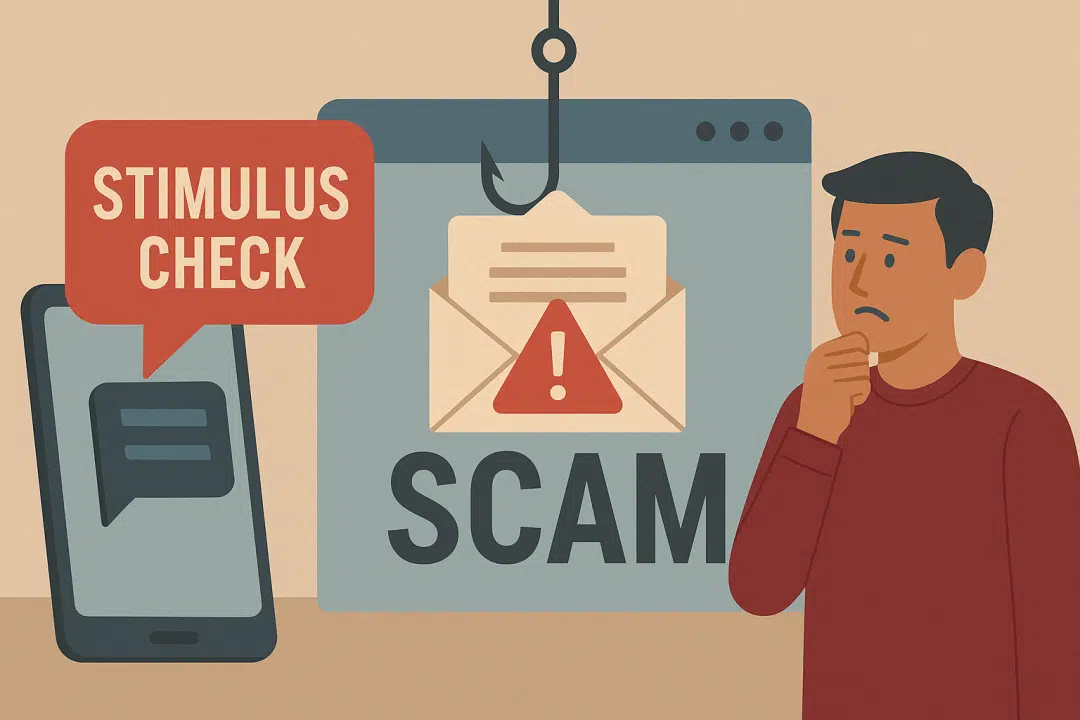As Americans wait for updates on federal stimulus programs, scammers are moving fast to take advantage of the confusion. Across the U.S., fake IRS texts, emails, and websites are promising early access to “stimulus checks”—but it’s a trap.
Cybersecurity experts and the Internal Revenue Service (IRS) are warning that a new wave of stimulus check scams is targeting low-income families, seniors, and individuals who previously received pandemic-era relief.
What the 2025 scams look like

Most of the fraudulent messages share a few key features:
- Texts or emails claiming you’ve been approved for a stimulus check or refund
- Links to fake IRS portals that ask for Social Security numbers or bank info
- Phone calls impersonating IRS agents threatening you if you don’t respond
These scams often create a false sense of urgency, saying your “check will expire in 24 hours” or you must “click here to claim before the deadline.”
Some even appear to come from government domains—but they’re fake.
“The IRS will never contact you via email, text message, or social media to offer stimulus money,” the agency said in an April bulletin.
Real stimulus updates don’t work this way
If and when new federal stimulus checks are authorized, the IRS will update information at IRS.gov. You won’t need to sign up through third-party apps, social media posts, or text messages.
In 2025, no new federal stimulus payments have been approved, but lawmakers have proposed several forms of relief—including child tax credit expansions and Social Security reforms. Until Congress passes a new law, any offer of immediate cash should raise red flags.
Common signs it’s a scam
Here’s how to know if a stimulus check offer is fake:
- The message comes from an unofficial email or domain (like “@irs-relief.net”)
- The site asks for full SSN, bank routing numbers, or a photo of your ID
- The message pressures you to act quickly or risk losing payment
- You’re asked to pay a fee to receive your check
What to do if you receive a suspicious message
If you think a message is a scam:
- Do not click any links or respond.
- Take a screenshot and report it to the IRS at [email protected].
- File a complaint with the FTC at reportfraud.ftc.gov.
- Check for legitimate updates at IRS.gov/coronavirus.
If you’ve already clicked or shared information, contact your bank immediately and monitor your credit report for suspicious activity.
Stay informed—don’t get scammed
Stimulus-related fraud always spikes when economic uncertainty rises. These scams aren’t just annoying—they can lead to identity theft, tax refund delays, and drained bank accounts.
Bookmark IRS.gov and follow FingerLakes1.com to stay ahead on top of updates.
Related Coverage:
- When Will Stimulus Checks Arrive in 2025?
- Missed a Stimulus Check? Here’s How to Get Paid
- April 2025 Social Security Payments Explained
Related Reading
Want to check out more from FL1? Check out these related topics!
- Your Life, Your Money
- Stimulus Check News
- DOGE News
- Food Stamps & SNAP News
- Social Security News
- SSA Cost of Living Adjustment News
- IRS News
- Child Tax Credit News
- Latest from Congress
- Gas Prices
- Medicaid
- Medicare
Stay informed. For the latest breaking news and headlines from across the FL1 National Desk subscribe using the Google pop-up prompt or download the FingerLakes1.com App!
